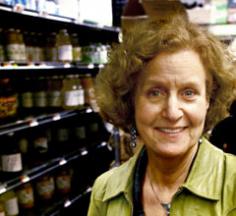Reposted from Food Systems Network NYC
 In anticipation of the second Brooklyn Food Conference on May 12th, Rosalin Luetum touched base with Nancy Romer (pictured left), the General Coordinator of the Coalition, to learn how the ‘movement’ has made strides and what the priority areas are now.
In anticipation of the second Brooklyn Food Conference on May 12th, Rosalin Luetum touched base with Nancy Romer (pictured left), the General Coordinator of the Coalition, to learn how the ‘movement’ has made strides and what the priority areas are now.
Rosalin Luetum (RL): The Brooklyn Food Coalition effort has been an impressive grass roots movement since it kicked off with the 2009 conference. Lots has happened in Brooklyn around food in particular over these last 3 years. As you anticipate and plan for this next and much bigger conference, we have some questions about the developments in this ‘movement’ from 2009 until now. Over the last three years:
RL: What would you say are the most significant developments in the ‘good food movement’ in Brooklyn?
Nancy Romer (NR): The biggest change has been in people’s consciousness. It has been a huge leap forward in the food movement. With that change has come the cross-fertilization of ideas in areas such as urban agriculture, providing access to healthy foods for all, sustainable agriculture, school food, and justice for food workers.
Awareness has been the biggest and most important piece, and there are a lot of other smaller pieces under that. For example, in terms of urban agriculture, more people are growing food at home and tending home gardens. The anti-fracking movement is exciting and powerful. With food workers, there are important campaigns shining a lot on sweatshops working to change current work conditions. The food co-op movement has been growing, and parents are working to improve the food in their kids’ schools.
RL: What in your view have been the short term ‘successes’?
NR: In addition to what I mentioned earlier, other short term success are less quantifiable. In the last five years, there has been an attitude change towards food. People are eating and thinking differently. There are people who don’t have access to healthy food and others who don’t seek it out. What’s important is to have people that are able to work with each other toward the shared goal of a better food system. Legislatively, two new pieces of legislation are coming up this week in City Council, one on improving school food and the other on living wages for workers—both key demands in the food movement. We’ve also had some small successes around farm to café and local sourcing in the last Child Nutrition Bill. The US Farm Bill will likely support some more small farm initiatives.
RL: What are the most difficult challenges that lie ahead? (Read the whole article.)
